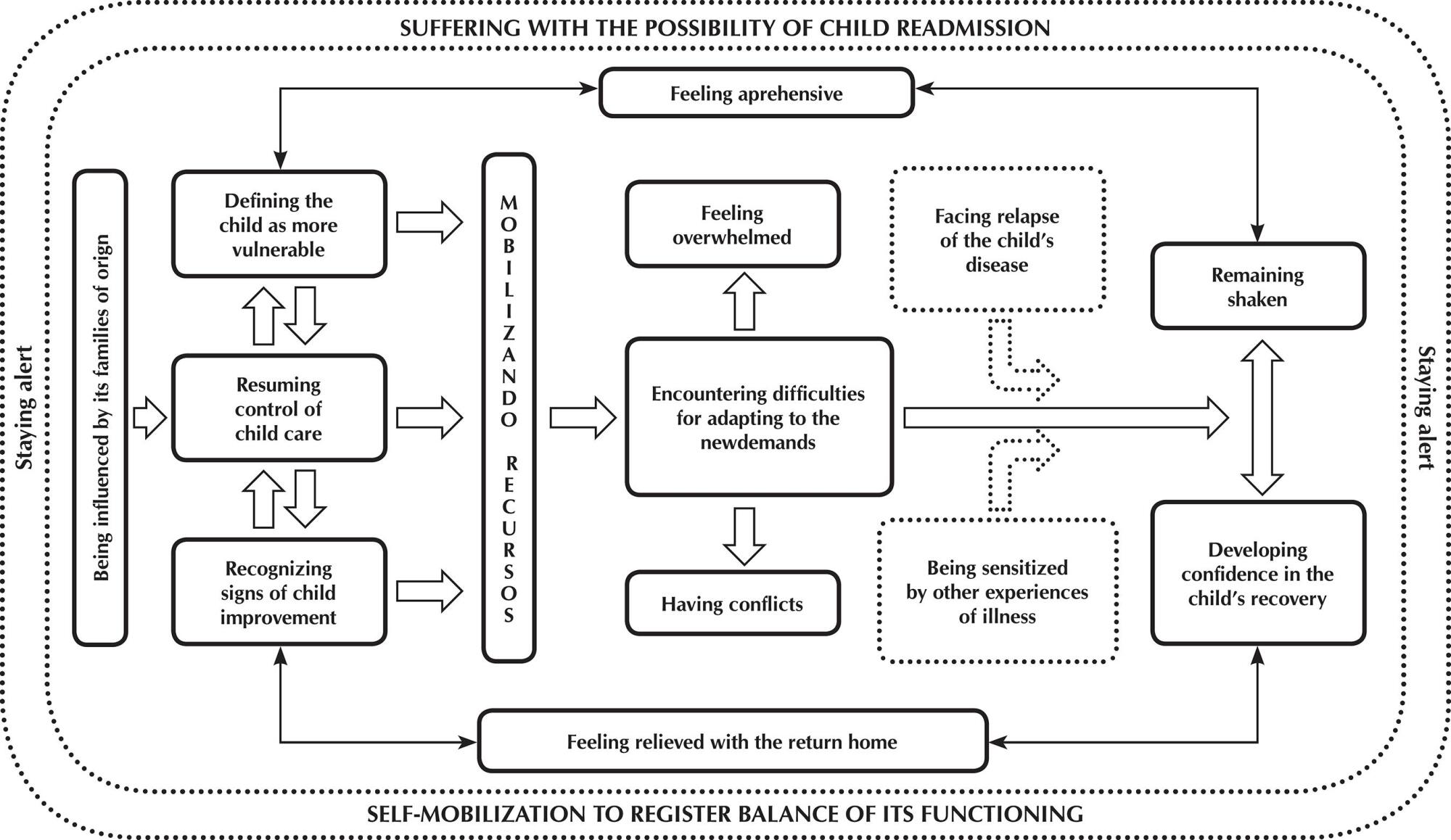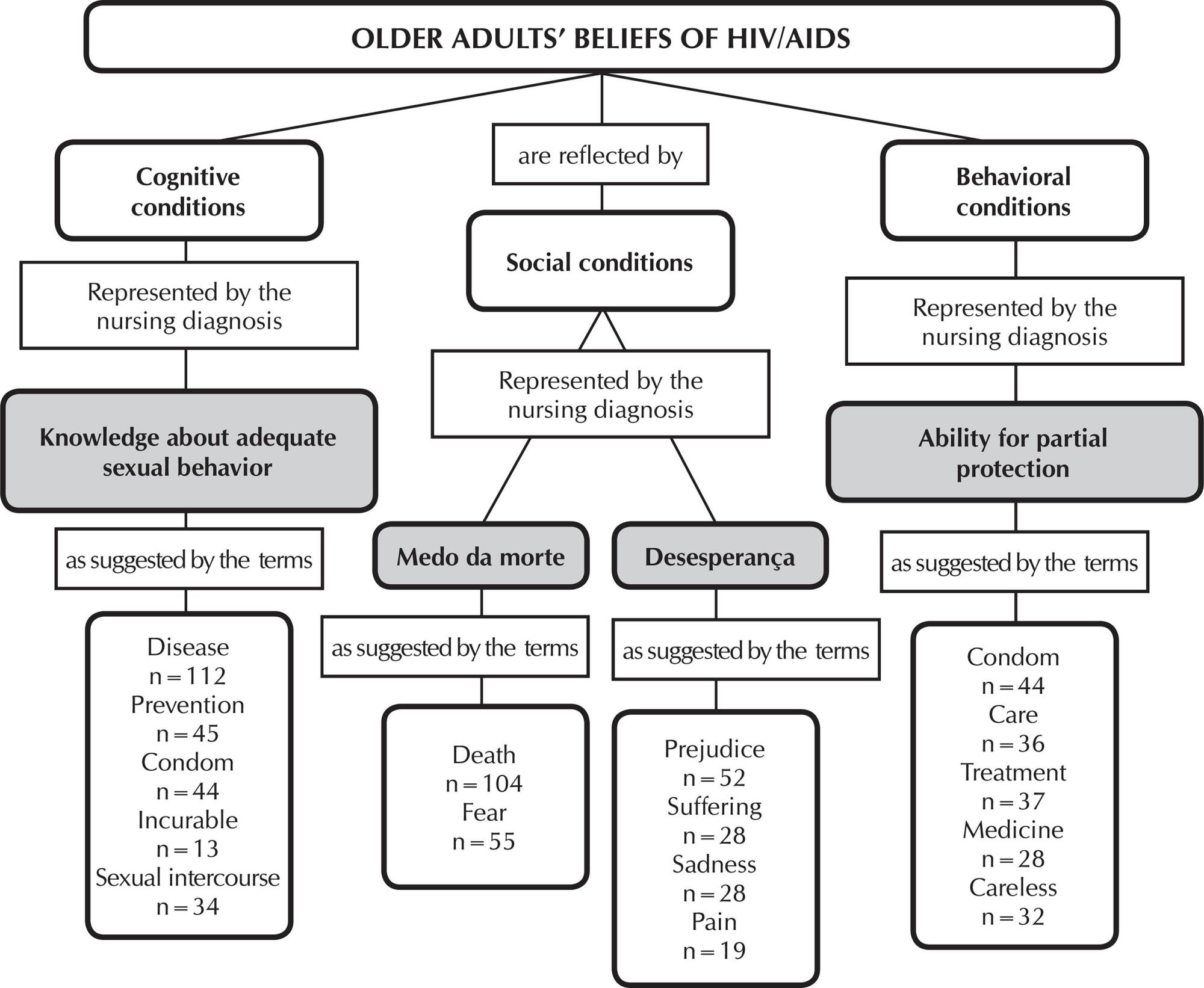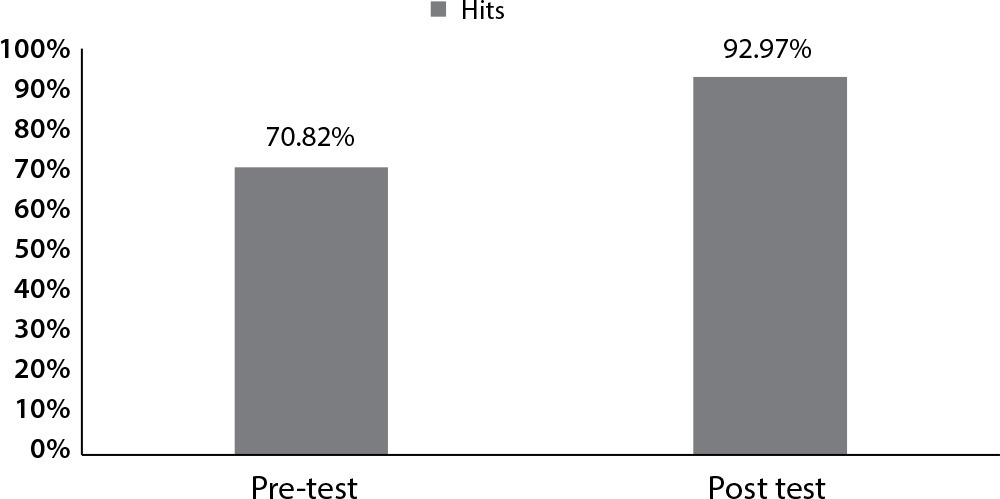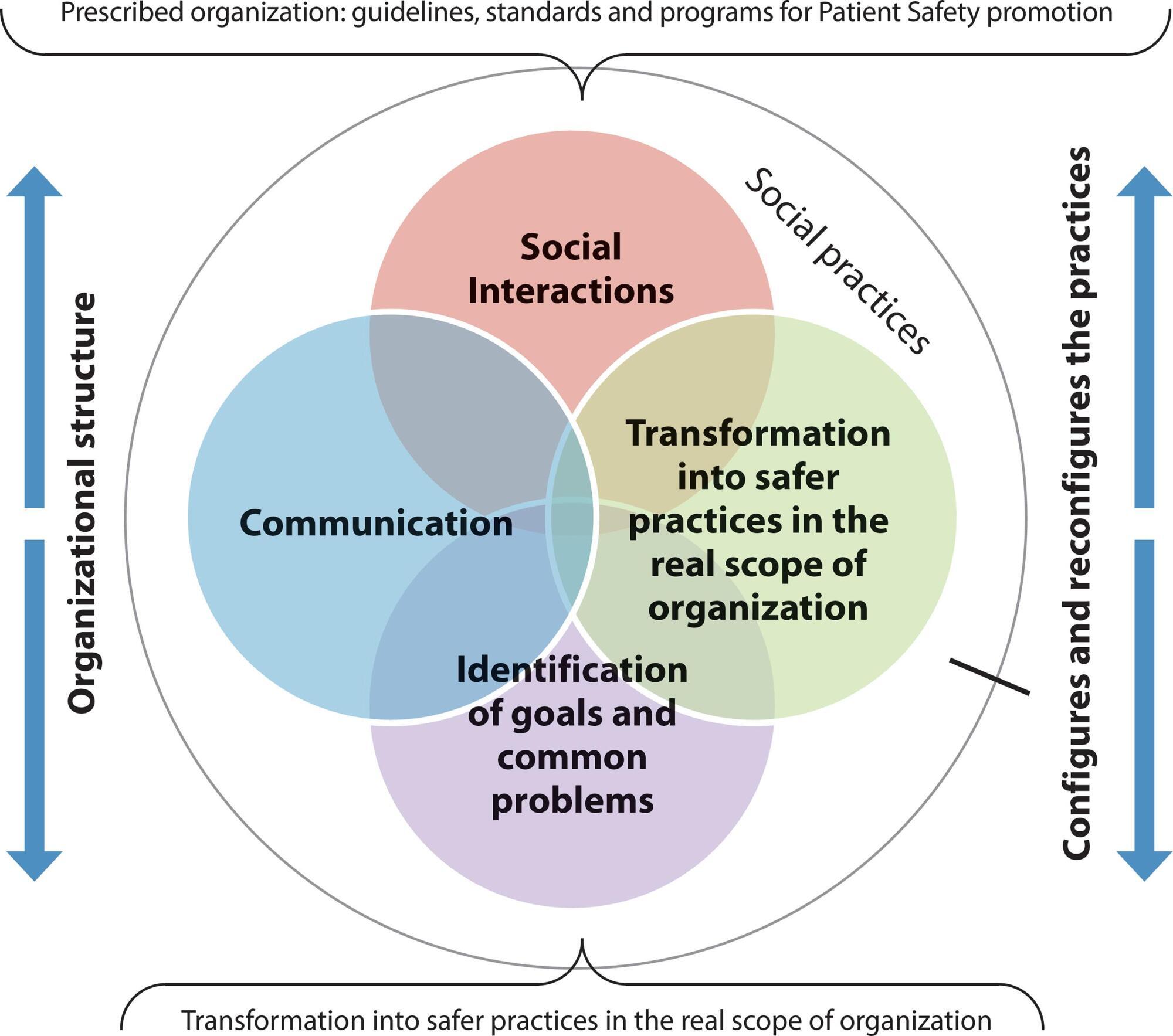-
01-01-2015
Social representations about religion and spirituality
Revista Brasileira de Enfermagem. 2015;68(4):609-616
Abstract
Social representations about religion and spirituality
Revista Brasileira de Enfermagem. 2015;68(4):609-616
DOI 10.1590/0034-7167.2015680406i
Views0See moreABSTRACT
Objective:
to identify the social representations about the concepts of spirituality and religion of of health teachers.
Method:
exploratory and descriptive study, based on a qualitative approach. 25 subjects participated in it. The following instruments were used to collect data: questionnaire to identify the profile; questionnaire of free association, whose inducing words were religion and spirituality, and an interview based on the scale FICA (Puchalski, 2006).
Results:
the representations about religion and spirituality, for professors, are forged around the faith in God and it gives them meaning and purpose to deal with the challenges of personal and professional living.
Conclusion:
there are still barriers that need to be overcome with a view to a comprehensive care. For this, it is essential to incorporate spirituality in the process in the curricula of health courses.

-
01-01-2015
Prevalence and factors associated with smoking among tobacco growers in southern Brazil
Revista Brasileira de Enfermagem. 2015;68(4):603-608
Abstract
Prevalence and factors associated with smoking among tobacco growers in southern Brazil
Revista Brasileira de Enfermagem. 2015;68(4):603-608
DOI 10.1590/0034-7167.2015680405i
Views0See moreABSTRACT
Objective:
identify the prevalence and factors associated with smoking in tobacco growers.
Method:
descriptive, cross-sectional research. Data collection occurred in 2012 through household survey and interviews, including application of a structured instrument and scale Fargeström.
Results:
there were 100 growers included, average age of 46,9 ± 10,8 years; 90(90%) married; 72(72%) white, average family composition 3,7±1,1 people; median number of children 3(1-3), and the average study time 6±2,5. The prevalence of smoking among tobacco growers was 17%, which had less education (p=0.010) and fewer people in the household (p=0.049).
Conclusion:
the prevalence of smoking among tobacco growers was higher than the national average, but the nicotine dependence was low, which can facilitate the smoking cessation process. Highlights the need to implement a program to control smoking among tobacco growers.
-
01-01-2015
The family living the child recovery process after hospital discharge
Revista Brasileira de Enfermagem. 2015;68(4):594-602
Abstract
The family living the child recovery process after hospital discharge
Revista Brasileira de Enfermagem. 2015;68(4):594-602
DOI 10.1590/0034-7167.2015680404i
Views1See moreABSTRACT
Objective:
to understand the meaning attributed by the family to its experience in the recovery process of a child affected by an acute disease after discharge, and to develop a theoretical model of this experience. Symbolic interactionism was adopted as a theoretical reference, and grounded theory was adopted as a methodological reference.
Method:
data were collected through interviews and participant observation with 11 families, totaling 15 interviews. A theoretical model consisting of two interactive phenomena was formulated from the analysis: Mobilizing to restore functional balance and Suffering from the possibility of a child’s readmission.
Results:
the family remains alert to identify early changes in the child’s health, in an attempt to avoid rehospitalization.
Conclusion:
the effects of the disease and hospitalization continue to manifest in family functioning, causing suffering even after the child’s discharge and recovery.

-
01-01-2015
Multiprofessional residency in health: a document analysis of political pedagogical projects
Revista Brasileira de Enfermagem. 2015;68(4):586-593
Abstract
Multiprofessional residency in health: a document analysis of political pedagogical projects
Revista Brasileira de Enfermagem. 2015;68(4):586-593
DOI 10.1590/0034-7167.2015680403i
Views0See moreABSTRACT
Objective:
To analyze MPRH political pedagogical projects (PPP) developed in the state of São Paulo and identify scenarios that are highly favorable to IPE.
Method:
This was a descriptive exploratory study conducted through document analysis.
Results:
The analysis revealed a heterogeneous scenario regarding the curricula, didactic and pedagogical organization, educational objectives, pedagogical matrices and evaluation systems employed. One of the programs was identified as providing a highly favorable setting for IPE.
Conclusion:
The analysis adequately evaluated IPE in educational settings and found a highly favorable scenario for it, identifying didactic, pedagogical, political and organizational MPRH elements.
-
01-01-2015
Beliefs of older adults about their vulnerability to HIV/Aids, for the construction of nursing diagnoses
Revista Brasileira de Enfermagem. 2015;68(4):579-585
Abstract
Beliefs of older adults about their vulnerability to HIV/Aids, for the construction of nursing diagnoses
Revista Brasileira de Enfermagem. 2015;68(4):579-585
DOI 10.1590/0034-7167.2015680402i
Views0See moreABSTRACT
Objective:
to know the beliefs of older adults about their vulnerability to HIV/Aids, and to identify nursing diagnoses.
Method:
a field research implemented in Family Health Units, in João Pessoa, Brazil. The sample included 250 older adults of both genders with data collected from April to July of 2011. A Test of Free Word Association was applied using the term HIV/Aids. A content analysis and cross-mapping of the most frequent terms with the International Classification for Nursing Practice, 2011 were performed.
Results:
202 terms were identified in terms, with an overall frequency of 1156. Of the 202 terms, 16 were more frequent and were used to construct the nursing diagnoses. The diagnoses identified were knowledge about appropriate sexual behavior, ability for partial protection, fear of death and hopelessness.
Conclusion:
understanding these beliefs drew from knowledge about factors related to, vulnerability to HIV/Aids aimed at planning health care actions for this population segment.

-
LETTER TO THE EDITOR01-01-2015
Considerations about the manuscript published
Revista Brasileira de Enfermagem. 2015;68(4):577-577
Abstract
LETTER TO THE EDITORConsiderations about the manuscript published
Revista Brasileira de Enfermagem. 2015;68(4):577-577
DOI 10.1590/0034-7167.20156804c
Views0Re: Chinese auriculotherapy to improve quality of life of nursing team To the Editor,[…]See more -
01-01-2015
A Pesquisa em Enfermagem e os novos rumos a partir do SENPE
Revista Brasileira de Enfermagem. 2015;68(4):571-572
Abstract
A Pesquisa em Enfermagem e os novos rumos a partir do SENPE
Revista Brasileira de Enfermagem. 2015;68(4):571-572
DOI 10.1590/0034-7167.2015680401i
Views0Após quase meio século do início da pesquisa em Enfermagem no Brasil, ainda há necessidade de investimentos para considerá-la consolidada. Os seminários nacionais que discutem a investigação nesta área demonstram esta afirmação ao longo de 17 eventos, por seus resultados e participação da categoria de pesquisadores e prestadores de serviço.O 18º Seminário Nacional de Pesquisa […]See more
-
EXPERIENCE REPORT01-01-2017
Focus group on qualitative research: experience report
Revista Brasileira de Enfermagem. 2017;70(2):424-429
Abstract
EXPERIENCE REPORTFocus group on qualitative research: experience report
Revista Brasileira de Enfermagem. 2017;70(2):424-429
DOI 10.1590/0034-7167-2016-0091
Views1See moreABSTRACT
Objective:
to report the experience of applying the focus group technique for production of data in qualitative research.
Method:
four group sessions were held from May to June 2015, with the participation of professionals from the public sector of PHC and from specialized service.
Results:
the way focus group was developed is described in steps: planning, recruitment, ambience, group sessions, and evaluation.
Conclusion:
we highlight that the focus group, as a technique to produce data in collective space, can contribute not only to the construction of knowledge in Nursing, but also to the research approach with the assistance practice.

-
RESEARCH01-01-2017
Guide of attributes of the nurse’s political competence: a methodological study
Revista Brasileira de Enfermagem. 2017;70(3):526-534
Abstract
RESEARCHGuide of attributes of the nurse’s political competence: a methodological study
Revista Brasileira de Enfermagem. 2017;70(3):526-534
DOI 10.1590/0034-7167-2016-0483
Views0See moreABSTRACT
Objective:
To build and validate a guide of attributes of the nurse’s political competence.
Method:
Methodological research. This study comprised the construction of the instrument through literature review; experts validation of pre-established attributes for composing the guide; and clinical validation in the nurses work environment/reality. The data collection took place in the months from August to October 2014, and the analysis was based on the content analysis of Bardin and use of Epi info 3.5. All ethical precepts have been complied with.
Results:
From 29 attributes found in the literature, 25 have been validated by experts. Clinical/practical validation involved the participation of 43 nurses, who observed that the attributes are not articulated with the professional practices developed by them.
Conclusion:
The attributes of the nurse’s political competence were identified with support of literature. It is concluded that the professionals still have limited and fragmented perception of political competence, expressing difficulty/limitation.
-
ORIGINAL ARTICLE11-26-2022
Vulnerability and quality of life of older persons in the community in different situations of family care
Revista Brasileira de Enfermagem. 2022;75:e20210034
Abstract
ORIGINAL ARTICLEVulnerability and quality of life of older persons in the community in different situations of family care
Revista Brasileira de Enfermagem. 2022;75:e20210034
DOI 10.1590/0034-7167-2021-0034
Views0See moreABSTRACT
Objective:
to correlate socio-contextual aspects, physical vulnerability and quality of life of older persons in the community in different situations of family care.
Methods:
epidemiological, a cross-sectional and analytical study, with elderly people in the community (n=769), with application of the instruments: Vulnerable Elders Survey-13 (VES-13), World Health Organization Quality of Life for Older Persons (WHOQOL-OLD) and the World Health Organization Quality of Life (WHOQOL-BREF); and socio-contextual data questionnaire.
Results:
the population assessed presented an average of regular quality of life in both the WHOQOL-BREF and the WHOQOL-OLD. Older non-vulnerable persons (62.2%) and those with close family contact (82.6%) have a better quality of life than the vulnerable (p<0.0001).
Conclusion:
lower quality of life scores and more distant families are related to vulnerable elderly people; thus, the assessment of family proximity and physical vulnerability of older persons is shown to be an important factor in improving quality of life.
-
ORIGINAL ARTICLE10-09-2023
Independent and combined effects of lifestyle behaviors on adolescent health-related quality of life
Revista Brasileira de Enfermagem. 2023;76(4):e20220780
Abstract
ORIGINAL ARTICLEIndependent and combined effects of lifestyle behaviors on adolescent health-related quality of life
Revista Brasileira de Enfermagem. 2023;76(4):e20220780
DOI 10.1590/0034-7167-2022-0780
Views0See moreABSTRACT
Objective:
To investigate the independent and combined effects of lifestyle behaviors, including physical activity, sedentary behavior, sleep duration and food intake, in the health-related quality of life (HRQoL) of Brazilian adolescents.
Methods:
Cross-sectional school-based study, with the participation of 306 adolescents aged 14 to 18 years. A questionnaire was applied with structured questions to collect lifestyle behaviors data. Perception of the HRQoL was identified using the Kidscreen-27. The study used covariance analysis and linear regression models for statistical analysis.
Results:
Adolescents who reported ≤ 2 hours/day of screen-based sedentary behavior and sleep duration equivalent to 8-10 hours/night presented significantly higher HRQoL. Adolescents who reported joint adherence ≥ 3 healthy lifestyle behaviors demonstrated approximately two [OR=2.12] to three times [OR=3.04] more chance of presenting higher perceptions of HRQoL.
Conclusion:
Although healthy lifestyle behaviors had a positive independent effect on HRQoL, joint adherence to healthy behaviors enhances the cumulative effect.

-
ORIGINAL ARTICLE12-04-2023
Social representation of spiritual surgeries in Umbanda: culture, religion and contributions of nursing theory
Revista Brasileira de Enfermagem. 2023;76(6):e20220787
Abstract
ORIGINAL ARTICLESocial representation of spiritual surgeries in Umbanda: culture, religion and contributions of nursing theory
Revista Brasileira de Enfermagem. 2023;76(6):e20220787
DOI 10.1590/0034-7167-2022-0787
Views1See moreABSTRACT
Objective:
to analyze the social representation of spiritual surgeries in Umbanda for Bantu-Amerindian ritual mediums and their contributions to the cross-cultural care proposed by Madeleine Leininger.
Methods:
a descriptive-exploratory, qualitative study, supported by the procedural approach of Social Representation Theory and Transcultural Nursing Theory, carried out with 30 Umbanda mediums of the Bantu-Amerindian ritual through interviews, submitted to the Iramuteq software for lexical analysis.
Results:
mostly women, white, with an average of 46 years old and approximately 14 years of practice in Umbanda participated. The social representation of spiritual surgeries in Umbanda is objectified and anchored through a biomedical vision of care, encompassing a set of beliefs, values and practices as religious treatments, through faith, whose main objective is healing.
Final considerations:
spiritual surgeries are a form of transcultural care, according to Madeleine Leininger’s propositions, as they integrate the culture of a group through health care in Umbanda.

-
ORIGINAL ARTICLE05-29-2023
Quality of life from women’s perspective in the exercise of sex work: a study of social representations
Revista Brasileira de Enfermagem. 2023;76:e20220169
Abstract
ORIGINAL ARTICLEQuality of life from women’s perspective in the exercise of sex work: a study of social representations
Revista Brasileira de Enfermagem. 2023;76:e20220169
DOI 10.1590/0034-7167-2022-0169
Views1See moreABSTRACT
Objectives:
to analyze the social representations elaborated by sex workers from Alto Sertão Produtivo Baiano about quality of life.
Methods:
a qualitative study, based on the Social Representation Theory, carried out in the region of Alto Sertão Produtivo Baiano, with 30 sex workers. Individual in-depth interview was carried out, with speeches organized in a corpus and treated in IRAMUTEQ, enabling lexical analysis for Descending Hierarchical Classification.
Results:
four thematic classes emerged, in which social representations of quality of life pervade: money earned to supply needs; association with healthy living and obtaining health (physical and mental); balance of emotions (although there are some negative sensations such as fear and anxiety); and faith in a deity.
Final Considerations:
the social representations elaborated by sex workers about quality of life are anchored in concepts, subjective and practical, punctuated by the World Health Organization.

-
ORIGINAL ARTICLE05-29-2023
Violence in rural areas against disabled people from the perspective of their families
Revista Brasileira de Enfermagem. 2023;76:e20220404
Abstract
ORIGINAL ARTICLEViolence in rural areas against disabled people from the perspective of their families
Revista Brasileira de Enfermagem. 2023;76:e20220404
DOI 10.1590/0034-7167-2022-0404
Views0See moreABSTRACT
Objectives:
to know the violence spoken and felt by disabled people, living in rural areas, from the perspective of their families.
Methods:
a descriptive-exploratory and qualitative study, carried out in four municipalities in Rio Grande do Sul, Brazil. Twelve family members who lived with disabled people in rural areas participated. Data were collected through semi-structured interviews and analyzed using thematic content analysis.
Results:
disabled people, living in rural areas, experienced physical, psychological and sexual violence, perpetrated by family members, colleagues, community members and health professionals. Adaptations were mentioned in family dynamics for the care of disabled people, social, financial and leisure impacts, and challenges in access and accessibility to education and health services.
Final Considerations:
violence against this population manifests itself in a reality with socioeconomic and family particularities, marked by exclusion, disrespect and denial of rights and access to fundamental goods and services.

-
ORIGINAL ARTICLE12-08-2023
Care for older adults with disabilities in Long Term Care Facility
Revista Brasileira de Enfermagem. 2023;76:e20220767
Abstract
ORIGINAL ARTICLECare for older adults with disabilities in Long Term Care Facility
Revista Brasileira de Enfermagem. 2023;76:e20220767
DOI 10.1590/0034-7167-2022-0767
Views0See moreABSTRACT
Objective:
to analyze the constitution of care offered to older adults with disabilities, from Long Term Care Facility professionals’ perspective.
Methods:
this is a discourse analysis based on the post-structuralist framework. Participants in this study are professionals involved in the care for older adults, totaling 14 respondents, 13 women and one man.
Results:
from professionals’ perspective, there is a fine line between caring for older adults with disabilities and maintaining their autonomy. Care in which autonomy is restricted predisposes older adults to a process of dependency.
Final considerations:
caring for older adults with disabilities constitutes the challenge between caring and maintaining independence. Thus, older adult-centered care should be taken as a premise so that their individualities are respected.
-
ORIGINAL ARTICLE11-10-2022
Effect of educational video on newborn care for the knowledge of pregnant and postpartum women and their families
Revista Brasileira de Enfermagem. 2022;75:e20201371
Abstract
ORIGINAL ARTICLEEffect of educational video on newborn care for the knowledge of pregnant and postpartum women and their families
Revista Brasileira de Enfermagem. 2022;75:e20201371
DOI 10.1590/0034-7167-2020-1371
Views0See moreABSTRACT
Objectives:
to evaluate the effect of educational video on newborn care to increase the knowledge of pregnant, postpartum, and family members.
Methods:
a quasi-experimental study, with pre-intervention and post-intervention evaluation with a single group. Fifty-eight pregnant, postpartum, and family members treated in basic health units and a hospital in Ceará, Brazil, participated. The study used the McNemar and binomial tests for the analysis.
Results:
after the intervention, there was an increase in the frequency of hits, from 70.82% to 92.97%. Most of the questions presented a significant increase of hits (p < 0.05) with an emphasis on sleeping position, drying of clothes, free demand for breastfeeding, and things to avoid (such as accessories in the sleeping place and talc in diaper change).
Conclusions:
the educational video was effective to participants in acquiring knowledge on the care of newborns and can assist in health education activities carried out by nurses.

-
ORIGINAL ARTICLE06-27-2019
Health literacy of adults with and without arterial hypertension
Revista Brasileira de Enfermagem. 2019;72(3):646-653
Abstract
ORIGINAL ARTICLEHealth literacy of adults with and without arterial hypertension
Revista Brasileira de Enfermagem. 2019;72(3):646-653
DOI 10.1590/0034-7167-2018-0366
Views1See moreABSTRACT
Objective:
Assess the level of health literacy of adults, with and without hypertension, treated in three basic health units (UBS) in Picos, Piauí.
Methods:
Cross-sectional study conducted with 357 adults. Data were collected using a questionnaire with sociodemographic variables, and literacy was assessed by the Test of Functional Literacy in Adults. Descriptive analysis was performed followed by the association between literacy and exposure variables with Pearson’s chi-squared (X2) test and Mann-Whitney U test.
Results:
Inadequate or marginal health literacy was found in three units investigated (71.5%; 77.8% and 85.2%);. Age and the years of schooling were factors associated with inadequate literacy in adults with hypertension (p<0.0001).
Conclusion:
Inadequate literacy was found in more than 70% of the hypertensive patients investigated. This finding reinforces the need to improve the self-care skills of hypertensive patients, especially the older ones and those with few years of schooling.
-
ORIGINAL ARTICLE03-30-2020
Clinical simulation in teaching Pediatric Nursing: students’ perception
Revista Brasileira de Enfermagem. 2020;73(2):e20180720
Abstract
ORIGINAL ARTICLEClinical simulation in teaching Pediatric Nursing: students’ perception
Revista Brasileira de Enfermagem. 2020;73(2):e20180720
DOI 10.1590/0034-7167-2018-0720
Views0See moreABSTRACT
Objectives:
to comprehend the perception of undergraduate nursing students about learning to care for the child and family through clinical simulation.
Methods:
this is a qualitative research conducted with ten nursing students through semi-structured interviews. Data were analyzed through content analysis.
Results:
data were organized into two categories: “learning a new way to learn,” in which students describe their experiences during the simulation, and “learning a new way to care,” in which they reflect on learning through simulation.
Final considerations:
we believe that clinical simulation practice in teaching should be encouraged because of the benefits it can offer to the students, faculty, patients and their families. However, we recommend further studies to validate scenarios of child and family healthcare.
-
ORIGINAL ARTICLE10-18-2022
Methodological path to reach the degree of saturation in qualitative research: grounded theory
Revista Brasileira de Enfermagem. 2022;75(2):e20201379
Abstract
ORIGINAL ARTICLEMethodological path to reach the degree of saturation in qualitative research: grounded theory
Revista Brasileira de Enfermagem. 2022;75(2):e20201379
DOI 10.1590/0034-7167-2020-1379
Views0See moreABSTRACT
Objectives:
to achieve the degree of saturation in study that applied the grounded theory.
Methods:
qualitative research, carried out in four Family Health Units, between June 2018 and May 2019. The data from the interviews with 30 health professionals and non-participant observation were coded in the stages: open, axial and integration.
Results:
the degree of saturation was achieved by two conceptual models – theoretical saturation and inductive thematic. Theoretical saturation was considered: the development of conceptual codes and observation, in the collection and analysis of data, when they generated new categories/subcategories or only indicated increasing instances. For thematic inductive saturation, the use of new codes based on each interview stood out.
Final Considerations:
the visual layout for the number of codes, the theoretical scope of the concepts and the delimitation of the sample groups guided the identification of the degree of saturation for the development of the conceptual body that supported the substantive theory.
-
08-01-2022
Monkeypox: between precision public health and stigma risk
Revista Brasileira de Enfermagem. 2022;75(5):e750501
Abstract
Monkeypox: between precision public health and stigma risk
Revista Brasileira de Enfermagem. 2022;75(5):e750501
DOI 10.1590/0034-7167.2022750501
Views0The World Health Organization (WHO) is on alert due to an unprecedented Monkeypox outbreak in non-endemic countries, such as Europe, which have been affected recently. Despite the low pandemic potential, the recent SARS-CoV-2 pandemic has contributed to heightened levels of public concern in the face of the threat of new global health emergencies().As of May […]See more -
ORIGINAL ARTICLE11-02-2020
Transitional care from hospital to home for older people: implementation of best practices
Revista Brasileira de Enfermagem. 2020;73:e20200187
Abstract
ORIGINAL ARTICLETransitional care from hospital to home for older people: implementation of best practices
Revista Brasileira de Enfermagem. 2020;73:e20200187
DOI 10.1590/0034-7167-2020-0187
Views0See moreABSTRACT
Objective:
to assess the conformity of nursing care concerning best evidence in transitional care from hospital to home for older people.
Methods:
a project to implement best evidence based on the model proposed by the Joanna Briggs Institute in surgical clinic of a university hospital with older people, caregivers or family members, and nurses, between July and August 2019. Eight evidence-based criteria have been audited through interviews, medical records and computerized system, presented in percentages.
Results:
the highest non-compliance rate found in a baseline audit was absence of continued training on transitional care and hospital discharge plan. Identifying barriers to best practices included educational programs; afterwards, there was an improvement in compliance rates in all the criteria assessed.
Final considerations:
the criteria based on audited evidence showed an increase in compliance rates with the strategies implemented, contributing to improving transitional care for older people.

-
ORIGINAL ARTICLE10-21-2019
Practice challenges in patient safety
Revista Brasileira de Enfermagem. 2019;72(6):1504-1511
Abstract
ORIGINAL ARTICLEPractice challenges in patient safety
Revista Brasileira de Enfermagem. 2019;72(6):1504-1511
DOI 10.1590/0034-7167-2018-0441
Views0See moreABSTRACT
Objective:
to understand the professional practice challenges in reaching the goals and objectives of the National Patient Safety Program (Programa Nacional de Segurança do Paciente).
Method:
qualitative case study, based on the Comprehensive Sociology, carried out with 31 professionals from the Patient Safety Center (Núcleo de Segurança do Paciente) and the nursing team, working in a teaching hospital. Data collection took place between May and December 2015 through interviews, observation and documentary analysis. The analysis proceeded according to the prerogatives of the Content Analysis.
Results:
three categories emerged: the prescribed reality; material resources and their impact on care; and human resources related to the reality.
Final considerations:
challenges to safe professional practice are caused by inadequate physical structure, insufficient physical and human resources, but mainly invade the transition from the prescriptive reality scope.

-
RESEARCH01-24-2017
Nurses in the labor market: professional insertion, competencies and skills
Revista Brasileira de Enfermagem. 2017;70(6):1220-1226
Abstract
RESEARCHNurses in the labor market: professional insertion, competencies and skills
Revista Brasileira de Enfermagem. 2017;70(6):1220-1226
DOI 10.1590/0034-7167-2016-0061
Views0See moreABSTRACT
Objective:
to characterize nurses graduated from the School of Nursing of the University of São Paulo, from 2006 to 2012; verify their entry, facilitating factors and difficulties of these graduates in the labor market and to consider their skills and competences in the world of work.
Method:
an exploratory, descriptive study with a qualitative approach.
Results:
out of 505 graduates, 172 (34.1%) participated in the research. Entry into the labor market was mainly via public hospital institutions, in the SE of Brazil, in the caregiving sectors. The greater part remained from one to two years in their first job. Most agreed that they were prepared to meet the health needs of the population. Furthermore, they had been encouraged to seek systematic and continuous improvement in a critical, reflexive and creative way, while combining technical-scientific knowledge and personal skills.
Conclusion:
the results show that the University of São Paulo has been preparing nurses for work in the labor market, in accordance with the provisions of the National Curricular Guidelines.
Search
Search in:
Nuvem de Tags
Adolescente (85) Atenção Primária à Saúde (239) COVID-19 (91) Criança (91) Cuidados de Enfermagem (269) Educação em Enfermagem (151) Educação em Saúde (139) Enfermagem (930) Enfermagem Pediátrica (86) Estudantes de Enfermagem (77) Estudos de Validação (131) Família (87) Idoso (208) Promoção da Saúde (99) Qualidade de Vida (104) Saúde do Trabalhador (86) Saúde Mental (145) Saúde Pública (82) Segurança do Paciente (150) Tecnologia Educacional (100)



